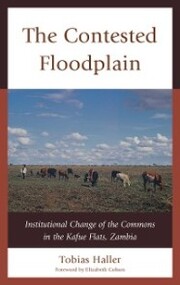Detailansicht
The Contested Floodplain
eBook - Institutional Change of the Commons in the Kafue Flats, Zambia
ISBN/EAN: 9780739169575
Umbreit-Nr.: 2140821
Sprache:
Englisch
Umfang: 584 S.
Format in cm:
Einband:
Keine Angabe
Erschienen am 27.12.2012
Auflage: 1/2012
E-Book
Format: EPUB
DRM: Adobe DRM
- Zusatztext
- <span><span><span>The Contested Floodplain</span><span> tells the story of institutional changes in the management of common pool resources (pasture, wildlife, and fisheries) among Ila and Balundwe agro-pastoralists and Batwa fishermen in the Kafue Flats, in southern Zambia. It explains how and why a once rich floodplain area, managed under local common property regimes, becomes a poor mans place and a degraded resource area. Based on social anthropological field research, the book explains how well working institutions in the past, regulating communal access to resources, have turned into state property and open access or privatization. As a basis for analysis, the author uses Elinor Ostroms design principles for well working institutions and the approach of the New Institutionalism by Jean Ensminger. The latter approach focuses on external factors and change in relative prices. It explains how local actors face changing bargaining power and use different ideologies to legitimize and shape resource use regulations. The study focuses on the historic developments taking place since pre-colonial and colonial times up to today. Haller shows how the commons had been well regulated by local institutions in the past, often embedded in religious belief systems. He then explains the transformation from common property to state property since colonial times. When the state is unable to provide well functioning institutions due to a lack in financial income, it contributes to</span><span>de facto</span><span> open access and degradation of the commons. The Zambian copper-based economy has faced crisis since 1975, and many Zambians have to look for economic alternatives and find ways to profit from the lack of state control (a paradox of the present-absent state). And while the state is absent, external actors use the ideology of citizenship to justify free use of resources during conflicts with local people. Also within Zambian communities, floodplain resources are highly contested, which is illustrated through conflicts over a proposed irrigation scheme in the area. The different actors and interest groups use ideologies such as citizenship vs. being indigenous, ethnic identity vs. class conflict, and modernity vs traditional way of life to legitimize land claims.</span></span></span>
- Kurztext
- <span><span><span>The Contested Floodplain</span><span> explains how institutional change in the African floodplain wetlands of Zambia (Kafue Flats) caused the area's resource management to fail. This work combines New Institutionalism approaches (predicated on notions of power and ideology) with political ecology and findings from local ecological studies, extending its appeal to scholars in African and environmental studies. It includes an in-depth social anthropological analysis of agro-pastoral and fishermen communities and also a foreword by Dr. Elizabeth Colson.</span></span></span>
- Autorenportrait
- <span><span><span>Tobias Haller, Ph.D in Social Anthropology University of Zurich, Switzerland (2001) is now Associate Professor at the Institute of Social Anthropology, University of Bern, Switzerland and lecturer at the ETH Zurich. He did fieldwork in Cameroon and Zambia and has specialized in economic and ecological anthropology (common pool resource management, New Institutionalism and local perception of environment, peasants and agro-pastoralist, fishermen, oil exploitation, protected areas, and community based natural resource management). He teaches courses in economic, political, and ecological anthropology on topics such as sustainable use of natural resources, environmental perception, conservation and protected areas, land tenure issues, and anthropology of mining. He has published</span><span>People, Protected Areas and Global Change</span><span>(NCCR Bern, 2008) and</span><span>Fossil Resources, Oil Companies and Indigenous People</span><span>s (Lit) as well as in journals such as</span><span>Human Ecology</span><span>,</span><span>Environment and Development</span><span>,</span><span>Development Southern Africa</span><span>,</span><span>Food Policy, Human Organisation</span><span>,</span><span>Journal of International Development.</span></span></span>
